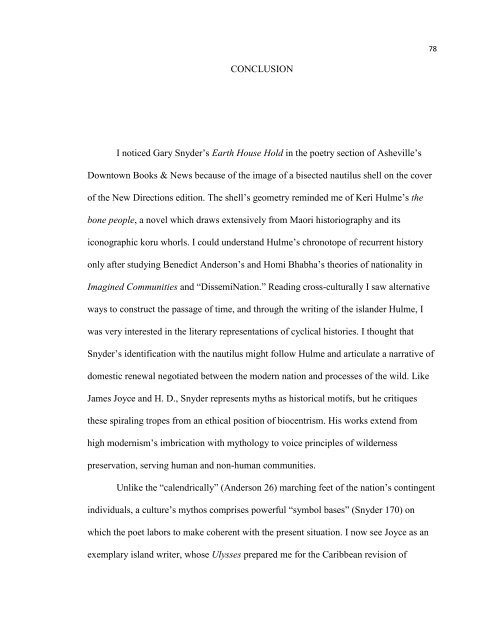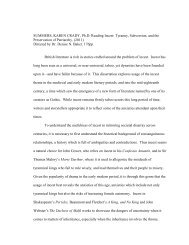RE-INHABITING THE ISLANDS - The University of North Carolina at ...
RE-INHABITING THE ISLANDS - The University of North Carolina at ...
RE-INHABITING THE ISLANDS - The University of North Carolina at ...
Create successful ePaper yourself
Turn your PDF publications into a flip-book with our unique Google optimized e-Paper software.
78<br />
CONCLUSION<br />
I noticed Gary Snyder‘s Earth House Hold in the poetry section <strong>of</strong> Asheville‘s<br />
Downtown Books & News because <strong>of</strong> the image <strong>of</strong> a bisected nautilus shell on the cover<br />
<strong>of</strong> the New Directions edition. <strong>The</strong> shell‘s geometry reminded me <strong>of</strong> Keri Hulme‘s the<br />
bone people, a novel which draws extensively from Maori historiography and its<br />
iconographic koru whorls. I could understand Hulme‘s chronotope <strong>of</strong> recurrent history<br />
only after studying Benedict Anderson‘s and Homi Bhabha‘s theories <strong>of</strong> n<strong>at</strong>ionality in<br />
Imagined Communities and ―DissemiN<strong>at</strong>ion.‖ Reading cross-culturally I saw altern<strong>at</strong>ive<br />
ways to construct the passage <strong>of</strong> time, and through the writing <strong>of</strong> the islander Hulme, I<br />
was very interested in the literary represent<strong>at</strong>ions <strong>of</strong> cyclical histories. I thought th<strong>at</strong><br />
Snyder‘s identific<strong>at</strong>ion with the nautilus might follow Hulme and articul<strong>at</strong>e a narr<strong>at</strong>ive <strong>of</strong><br />
domestic renewal negoti<strong>at</strong>ed between the modern n<strong>at</strong>ion and processes <strong>of</strong> the wild. Like<br />
James Joyce and H. D., Snyder represents myths as historical motifs, but he critiques<br />
these spiraling tropes from an ethical position <strong>of</strong> biocentrism. His works extend from<br />
high modernism‘s imbric<strong>at</strong>ion with mythology to voice principles <strong>of</strong> wilderness<br />
preserv<strong>at</strong>ion, serving human and non-human communities.<br />
Unlike the ―calendrically‖ (Anderson 26) marching feet <strong>of</strong> the n<strong>at</strong>ion‘s contingent<br />
individuals, a culture‘s mythos comprises powerful ―symbol bases‖ (Snyder 170) on<br />
which the poet labors to make coherent with the present situ<strong>at</strong>ion. I now see Joyce as an<br />
exemplary island writer, whose Ulysses prepared me for the Caribbean revision <strong>of</strong>
















